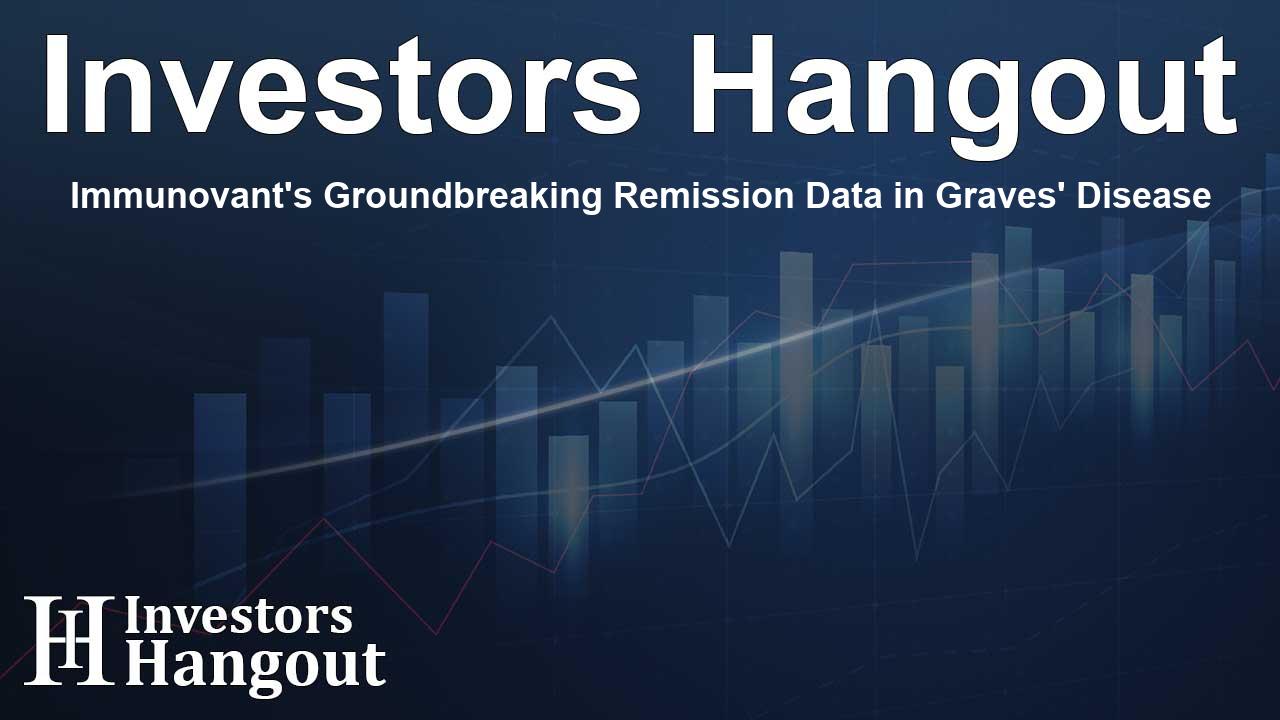Immunovant's Groundbreaking Remission Data in Graves' Disease

Immunovant's Innovative Data on Six-Month Remission in Graves' Disease
Immunovant, Inc., a clinical-stage immunology company focused on transforming lives for individuals with autoimmune diseases, has recently shared promising data that could potentially reshape the treatment landscape for patients with uncontrolled Graves' disease. Their breakthrough findings reveal significant insights from their six-month off-treatment data following therapy with batoclimab.
Transformative Data For Graves' Disease Patients
Among the patients involved in the study, 21 entered a six-month follow-up phase without treatment. Remarkably, about 80% of these patients, or 17 out of 21, sustained normal thyroid function, with their T3 and T4 levels falling within the normal range by the end of the follow-up period. This high response rate underlines the therapy's potential in offering lasting relief to patients who previously experienced uncontrolled symptoms.
Maintaining Quality of Life Without Medication
Of those who responded positively to the treatment, nearly half—approximately 50% or 8 out of 17—were able to remain free of anti-thyroid drugs (ATD) six months after stopping batoclimab. This outcome provides hope for patients seeking better management of their condition without the constant need for medication.
Groundbreaking Research Through Innovative Trials
The study’s results came from a proof-of-concept investigation utilizing batoclimab, which is recognized as the first fully human monoclonal antibody targeting FcRn. Patients had experienced hyperthyroidism and had previously been unable to manage their symptoms effectively with ATD therapy alone. The design of the study involved an initial 24-week treatment period followed by an equally significant 24-week follow-up phase.
The Details of the Study Approach
The treatment commenced with a weekly subcutaneous dose of 680 mg for the first 12 weeks, which was subsequently reduced to 340 mg for the following 12 weeks. The emphasis laid on achieving a stable normalization of thyroid hormone levels (T3 and T4) at the end of the study without needing to increase ATD dosage attempts at baseline. This structured approach aims to validate the hypothesis that FcRn blockade can modify the course of Graves' disease.
Observations Concerning Safety and Tolerability
The safety profile noted during the study was reported to be consistent with findings from prior research involving batoclimab. The manageable safety and tolerability outcomes bolster confidence in the therapy's viability.
Future Clinical Trials on IMVT-1402
In addition to the encouraging findings, Immunovant has initiated two potentially registrational trials for IMVT-1402, their lead compound in Graves' disease treatment, aimed at exploring higher dosing strategies without any reductions over extended treatment periods.
Next Steps for Immunovant
As these studies pilot ahead, significant milestones are anticipated to culminate in topline results projected for 2027. These developments signal a promising future for vaccine strategies that provide transformative results for those battling Graves' disease.
Eric Venker, CEO of Immunovant, expressed enthusiasm about the results, stating that they could serve an important role in addressing unmet patient needs within the field. The potential for batoclimab as an innovative treatment alternative showcases the ongoing commitment of Immunovant to lead advancements in autoimmune therapeutics.
Frequently Asked Questions
What is batoclimab and how does it work?
Batoclimab is a fully human monoclonal antibody designed to target FcRn, which plays a crucial role in autoimmunity by maintaining the presence of autoantibodies within the body.
What were the main findings regarding remission in the study?
The study found that about 80% of patients maintained their thyroid function within normal ranges after six months off treatment, and around 50% achieved remission without ATD.
How does this study impact current paradigms in Graves' disease treatment?
This research could shift how Graves' disease is managed by providing an alternative to traditional therapy involving long-term medication, suggesting potential for enhanced quality of life.
What are the next steps for Immunovant?
Immunovant is currently enrolling patients for two global clinical trials evaluating IMVT-1402 with results expected by 2027.
How can I learn more about Immunovant's developments?
You can find further information about Immunovant's ongoing research and treatment developments by visiting their website.
About The Author
Contact Olivia Taylor privately here. Or send an email with ATTN: Olivia Taylor as the subject to contact@investorshangout.com.
About Investors Hangout
Investors Hangout is a leading online stock forum for financial discussion and learning, offering a wide range of free tools and resources. It draws in traders of all levels, who exchange market knowledge, investigate trading tactics, and keep an eye on industry developments in real time. Featuring financial articles, stock message boards, quotes, charts, company profiles, and live news updates. Through cooperative learning and a wealth of informational resources, it helps users from novices creating their first portfolios to experts honing their techniques. Join Investors Hangout today: https://investorshangout.com/
The content of this article is based on factual, publicly available information and does not represent legal, financial, or investment advice. Investors Hangout does not offer financial advice, and the author is not a licensed financial advisor. Consult a qualified advisor before making any financial or investment decisions based on this article. This article should not be considered advice to purchase, sell, or hold any securities or other investments. If any of the material provided here is inaccurate, please contact us for corrections.
